Business Ethics Assignment: Challenges, Decisions, and Principles
VerifiedAdded on 2022/10/19
|6
|1827
|15
Homework Assignment
AI Summary
This assignment delves into the multifaceted realm of business ethics, addressing critical challenges managers encounter in establishing and maintaining ethical standards. It explores ethical dilemmas across various industries like banking, retail, education, catering, and construction design, analyzing the decisions that spark ethical issues. The assignment also examines the application of ethical theories and frameworks in guiding managerial decision-making, providing a structured approach to address ethical concerns. Furthermore, it identifies the underlying ethical principles inherent in key terminologies such as corporate responsibility, corporate social responsibility, corporate citizenship, sustainability, social innovation, social entrepreneurship, sustainability reporting, and the Citizen Report of State Audit Bureau / Kuwait, offering a comprehensive understanding of ethical considerations in business practices.

BUSINESS ETHICS
Paraphrase This Document
Need a fresh take? Get an instant paraphrase of this document with our AI Paraphraser
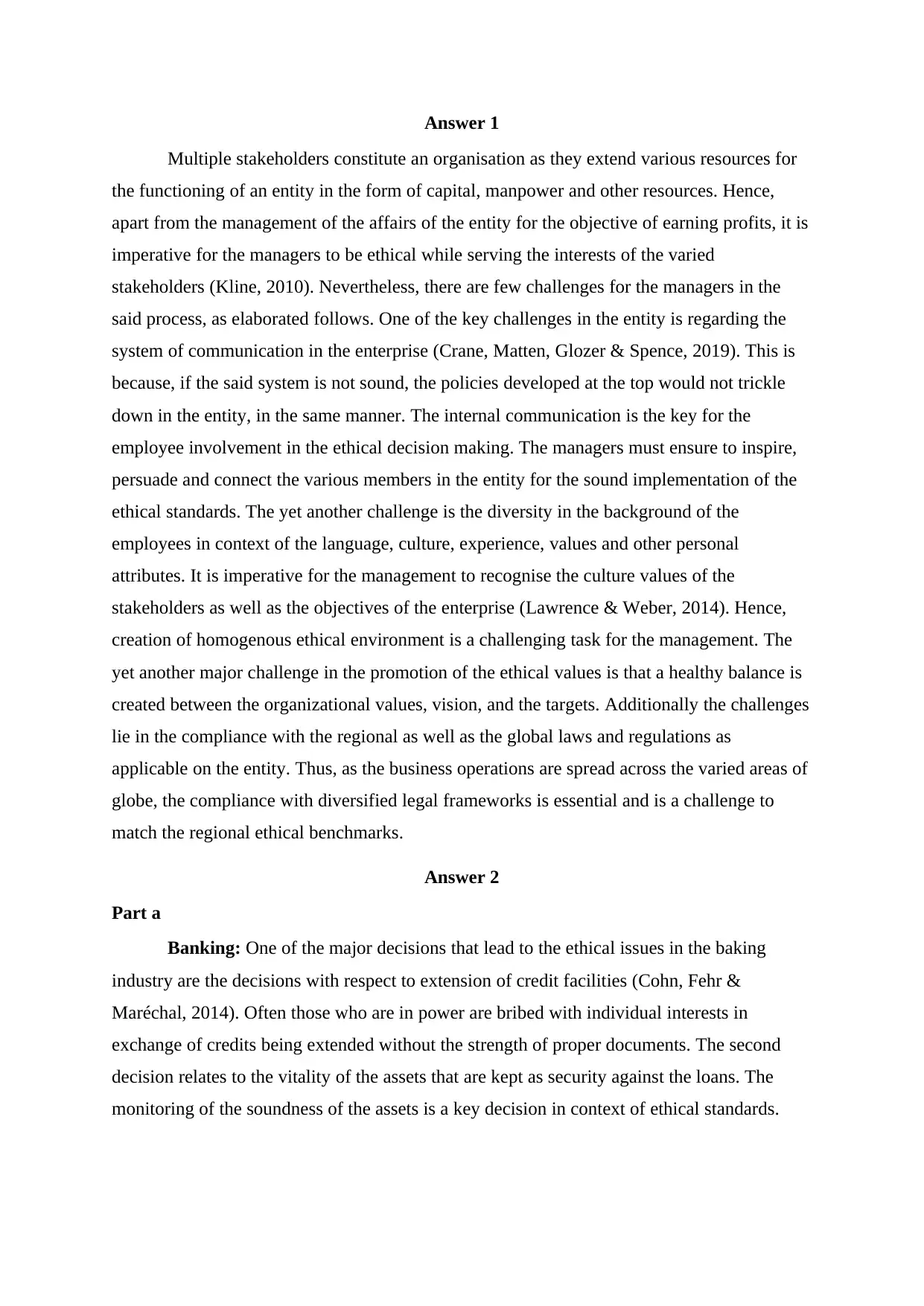
Answer 1
Multiple stakeholders constitute an organisation as they extend various resources for
the functioning of an entity in the form of capital, manpower and other resources. Hence,
apart from the management of the affairs of the entity for the objective of earning profits, it is
imperative for the managers to be ethical while serving the interests of the varied
stakeholders (Kline, 2010). Nevertheless, there are few challenges for the managers in the
said process, as elaborated follows. One of the key challenges in the entity is regarding the
system of communication in the enterprise (Crane, Matten, Glozer & Spence, 2019). This is
because, if the said system is not sound, the policies developed at the top would not trickle
down in the entity, in the same manner. The internal communication is the key for the
employee involvement in the ethical decision making. The managers must ensure to inspire,
persuade and connect the various members in the entity for the sound implementation of the
ethical standards. The yet another challenge is the diversity in the background of the
employees in context of the language, culture, experience, values and other personal
attributes. It is imperative for the management to recognise the culture values of the
stakeholders as well as the objectives of the enterprise (Lawrence & Weber, 2014). Hence,
creation of homogenous ethical environment is a challenging task for the management. The
yet another major challenge in the promotion of the ethical values is that a healthy balance is
created between the organizational values, vision, and the targets. Additionally the challenges
lie in the compliance with the regional as well as the global laws and regulations as
applicable on the entity. Thus, as the business operations are spread across the varied areas of
globe, the compliance with diversified legal frameworks is essential and is a challenge to
match the regional ethical benchmarks.
Answer 2
Part a
Banking: One of the major decisions that lead to the ethical issues in the baking
industry are the decisions with respect to extension of credit facilities (Cohn, Fehr &
Maréchal, 2014). Often those who are in power are bribed with individual interests in
exchange of credits being extended without the strength of proper documents. The second
decision relates to the vitality of the assets that are kept as security against the loans. The
monitoring of the soundness of the assets is a key decision in context of ethical standards.
Multiple stakeholders constitute an organisation as they extend various resources for
the functioning of an entity in the form of capital, manpower and other resources. Hence,
apart from the management of the affairs of the entity for the objective of earning profits, it is
imperative for the managers to be ethical while serving the interests of the varied
stakeholders (Kline, 2010). Nevertheless, there are few challenges for the managers in the
said process, as elaborated follows. One of the key challenges in the entity is regarding the
system of communication in the enterprise (Crane, Matten, Glozer & Spence, 2019). This is
because, if the said system is not sound, the policies developed at the top would not trickle
down in the entity, in the same manner. The internal communication is the key for the
employee involvement in the ethical decision making. The managers must ensure to inspire,
persuade and connect the various members in the entity for the sound implementation of the
ethical standards. The yet another challenge is the diversity in the background of the
employees in context of the language, culture, experience, values and other personal
attributes. It is imperative for the management to recognise the culture values of the
stakeholders as well as the objectives of the enterprise (Lawrence & Weber, 2014). Hence,
creation of homogenous ethical environment is a challenging task for the management. The
yet another major challenge in the promotion of the ethical values is that a healthy balance is
created between the organizational values, vision, and the targets. Additionally the challenges
lie in the compliance with the regional as well as the global laws and regulations as
applicable on the entity. Thus, as the business operations are spread across the varied areas of
globe, the compliance with diversified legal frameworks is essential and is a challenge to
match the regional ethical benchmarks.
Answer 2
Part a
Banking: One of the major decisions that lead to the ethical issues in the baking
industry are the decisions with respect to extension of credit facilities (Cohn, Fehr &
Maréchal, 2014). Often those who are in power are bribed with individual interests in
exchange of credits being extended without the strength of proper documents. The second
decision relates to the vitality of the assets that are kept as security against the loans. The
monitoring of the soundness of the assets is a key decision in context of ethical standards.
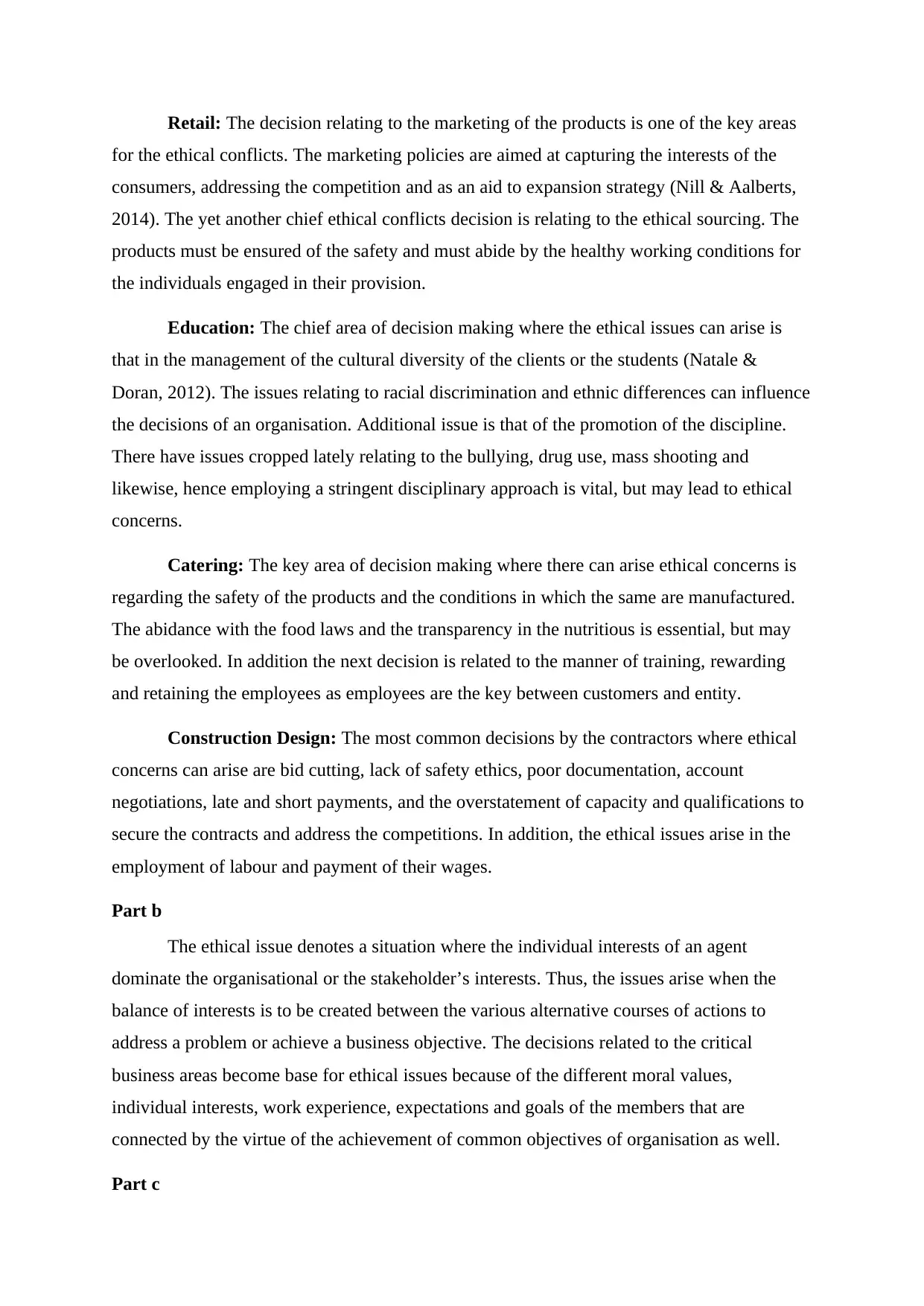
Retail: The decision relating to the marketing of the products is one of the key areas
for the ethical conflicts. The marketing policies are aimed at capturing the interests of the
consumers, addressing the competition and as an aid to expansion strategy (Nill & Aalberts,
2014). The yet another chief ethical conflicts decision is relating to the ethical sourcing. The
products must be ensured of the safety and must abide by the healthy working conditions for
the individuals engaged in their provision.
Education: The chief area of decision making where the ethical issues can arise is
that in the management of the cultural diversity of the clients or the students (Natale &
Doran, 2012). The issues relating to racial discrimination and ethnic differences can influence
the decisions of an organisation. Additional issue is that of the promotion of the discipline.
There have issues cropped lately relating to the bullying, drug use, mass shooting and
likewise, hence employing a stringent disciplinary approach is vital, but may lead to ethical
concerns.
Catering: The key area of decision making where there can arise ethical concerns is
regarding the safety of the products and the conditions in which the same are manufactured.
The abidance with the food laws and the transparency in the nutritious is essential, but may
be overlooked. In addition the next decision is related to the manner of training, rewarding
and retaining the employees as employees are the key between customers and entity.
Construction Design: The most common decisions by the contractors where ethical
concerns can arise are bid cutting, lack of safety ethics, poor documentation, account
negotiations, late and short payments, and the overstatement of capacity and qualifications to
secure the contracts and address the competitions. In addition, the ethical issues arise in the
employment of labour and payment of their wages.
Part b
The ethical issue denotes a situation where the individual interests of an agent
dominate the organisational or the stakeholder’s interests. Thus, the issues arise when the
balance of interests is to be created between the various alternative courses of actions to
address a problem or achieve a business objective. The decisions related to the critical
business areas become base for ethical issues because of the different moral values,
individual interests, work experience, expectations and goals of the members that are
connected by the virtue of the achievement of common objectives of organisation as well.
Part c
for the ethical conflicts. The marketing policies are aimed at capturing the interests of the
consumers, addressing the competition and as an aid to expansion strategy (Nill & Aalberts,
2014). The yet another chief ethical conflicts decision is relating to the ethical sourcing. The
products must be ensured of the safety and must abide by the healthy working conditions for
the individuals engaged in their provision.
Education: The chief area of decision making where the ethical issues can arise is
that in the management of the cultural diversity of the clients or the students (Natale &
Doran, 2012). The issues relating to racial discrimination and ethnic differences can influence
the decisions of an organisation. Additional issue is that of the promotion of the discipline.
There have issues cropped lately relating to the bullying, drug use, mass shooting and
likewise, hence employing a stringent disciplinary approach is vital, but may lead to ethical
concerns.
Catering: The key area of decision making where there can arise ethical concerns is
regarding the safety of the products and the conditions in which the same are manufactured.
The abidance with the food laws and the transparency in the nutritious is essential, but may
be overlooked. In addition the next decision is related to the manner of training, rewarding
and retaining the employees as employees are the key between customers and entity.
Construction Design: The most common decisions by the contractors where ethical
concerns can arise are bid cutting, lack of safety ethics, poor documentation, account
negotiations, late and short payments, and the overstatement of capacity and qualifications to
secure the contracts and address the competitions. In addition, the ethical issues arise in the
employment of labour and payment of their wages.
Part b
The ethical issue denotes a situation where the individual interests of an agent
dominate the organisational or the stakeholder’s interests. Thus, the issues arise when the
balance of interests is to be created between the various alternative courses of actions to
address a problem or achieve a business objective. The decisions related to the critical
business areas become base for ethical issues because of the different moral values,
individual interests, work experience, expectations and goals of the members that are
connected by the virtue of the achievement of common objectives of organisation as well.
Part c
⊘ This is a preview!⊘
Do you want full access?
Subscribe today to unlock all pages.

Trusted by 1+ million students worldwide
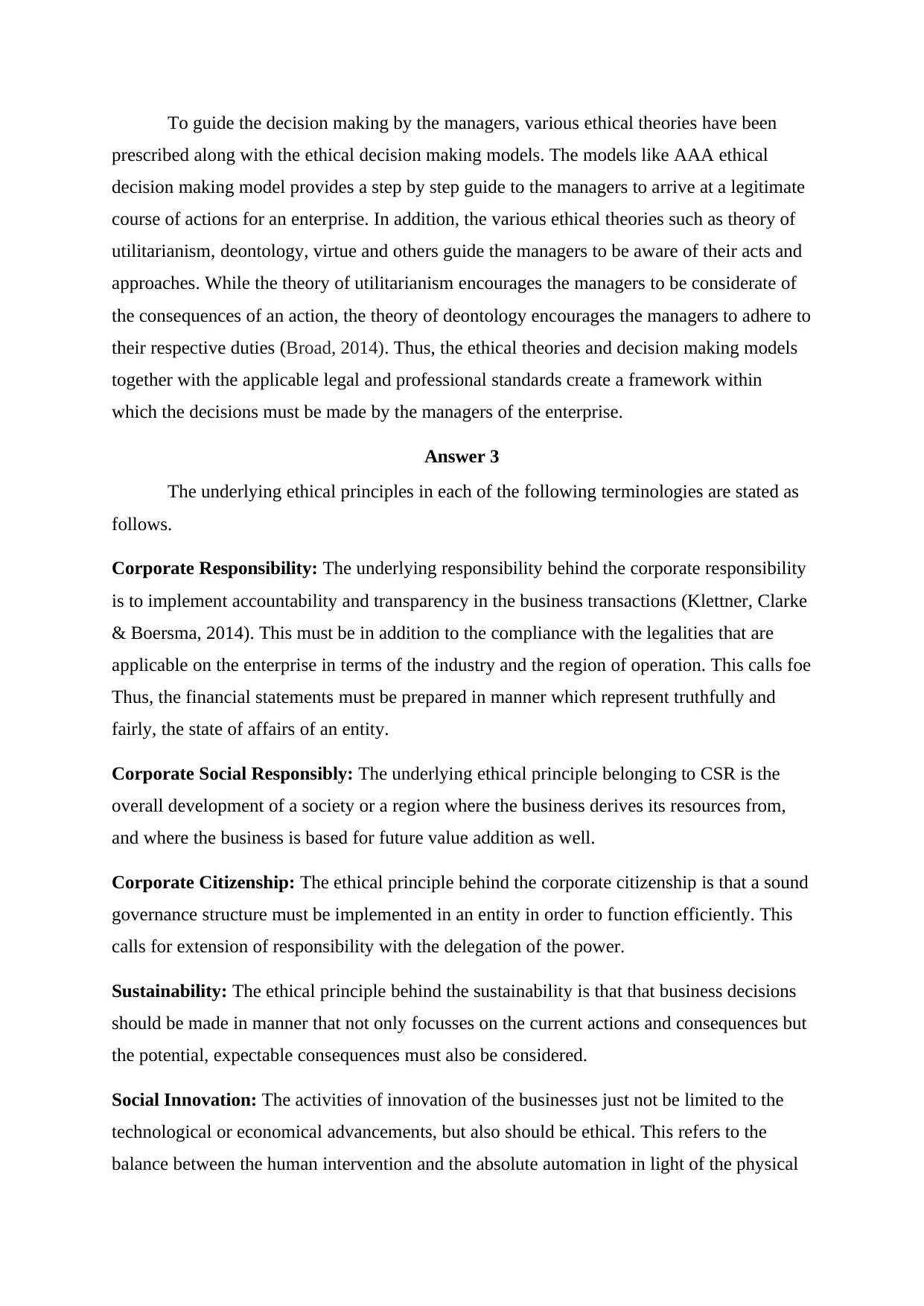
To guide the decision making by the managers, various ethical theories have been
prescribed along with the ethical decision making models. The models like AAA ethical
decision making model provides a step by step guide to the managers to arrive at a legitimate
course of actions for an enterprise. In addition, the various ethical theories such as theory of
utilitarianism, deontology, virtue and others guide the managers to be aware of their acts and
approaches. While the theory of utilitarianism encourages the managers to be considerate of
the consequences of an action, the theory of deontology encourages the managers to adhere to
their respective duties (Broad, 2014). Thus, the ethical theories and decision making models
together with the applicable legal and professional standards create a framework within
which the decisions must be made by the managers of the enterprise.
Answer 3
The underlying ethical principles in each of the following terminologies are stated as
follows.
Corporate Responsibility: The underlying responsibility behind the corporate responsibility
is to implement accountability and transparency in the business transactions (Klettner, Clarke
& Boersma, 2014). This must be in addition to the compliance with the legalities that are
applicable on the enterprise in terms of the industry and the region of operation. This calls foe
Thus, the financial statements must be prepared in manner which represent truthfully and
fairly, the state of affairs of an entity.
Corporate Social Responsibly: The underlying ethical principle belonging to CSR is the
overall development of a society or a region where the business derives its resources from,
and where the business is based for future value addition as well.
Corporate Citizenship: The ethical principle behind the corporate citizenship is that a sound
governance structure must be implemented in an entity in order to function efficiently. This
calls for extension of responsibility with the delegation of the power.
Sustainability: The ethical principle behind the sustainability is that that business decisions
should be made in manner that not only focusses on the current actions and consequences but
the potential, expectable consequences must also be considered.
Social Innovation: The activities of innovation of the businesses just not be limited to the
technological or economical advancements, but also should be ethical. This refers to the
balance between the human intervention and the absolute automation in light of the physical
prescribed along with the ethical decision making models. The models like AAA ethical
decision making model provides a step by step guide to the managers to arrive at a legitimate
course of actions for an enterprise. In addition, the various ethical theories such as theory of
utilitarianism, deontology, virtue and others guide the managers to be aware of their acts and
approaches. While the theory of utilitarianism encourages the managers to be considerate of
the consequences of an action, the theory of deontology encourages the managers to adhere to
their respective duties (Broad, 2014). Thus, the ethical theories and decision making models
together with the applicable legal and professional standards create a framework within
which the decisions must be made by the managers of the enterprise.
Answer 3
The underlying ethical principles in each of the following terminologies are stated as
follows.
Corporate Responsibility: The underlying responsibility behind the corporate responsibility
is to implement accountability and transparency in the business transactions (Klettner, Clarke
& Boersma, 2014). This must be in addition to the compliance with the legalities that are
applicable on the enterprise in terms of the industry and the region of operation. This calls foe
Thus, the financial statements must be prepared in manner which represent truthfully and
fairly, the state of affairs of an entity.
Corporate Social Responsibly: The underlying ethical principle belonging to CSR is the
overall development of a society or a region where the business derives its resources from,
and where the business is based for future value addition as well.
Corporate Citizenship: The ethical principle behind the corporate citizenship is that a sound
governance structure must be implemented in an entity in order to function efficiently. This
calls for extension of responsibility with the delegation of the power.
Sustainability: The ethical principle behind the sustainability is that that business decisions
should be made in manner that not only focusses on the current actions and consequences but
the potential, expectable consequences must also be considered.
Social Innovation: The activities of innovation of the businesses just not be limited to the
technological or economical advancements, but also should be ethical. This refers to the
balance between the human intervention and the absolute automation in light of the physical
Paraphrase This Document
Need a fresh take? Get an instant paraphrase of this document with our AI Paraphraser
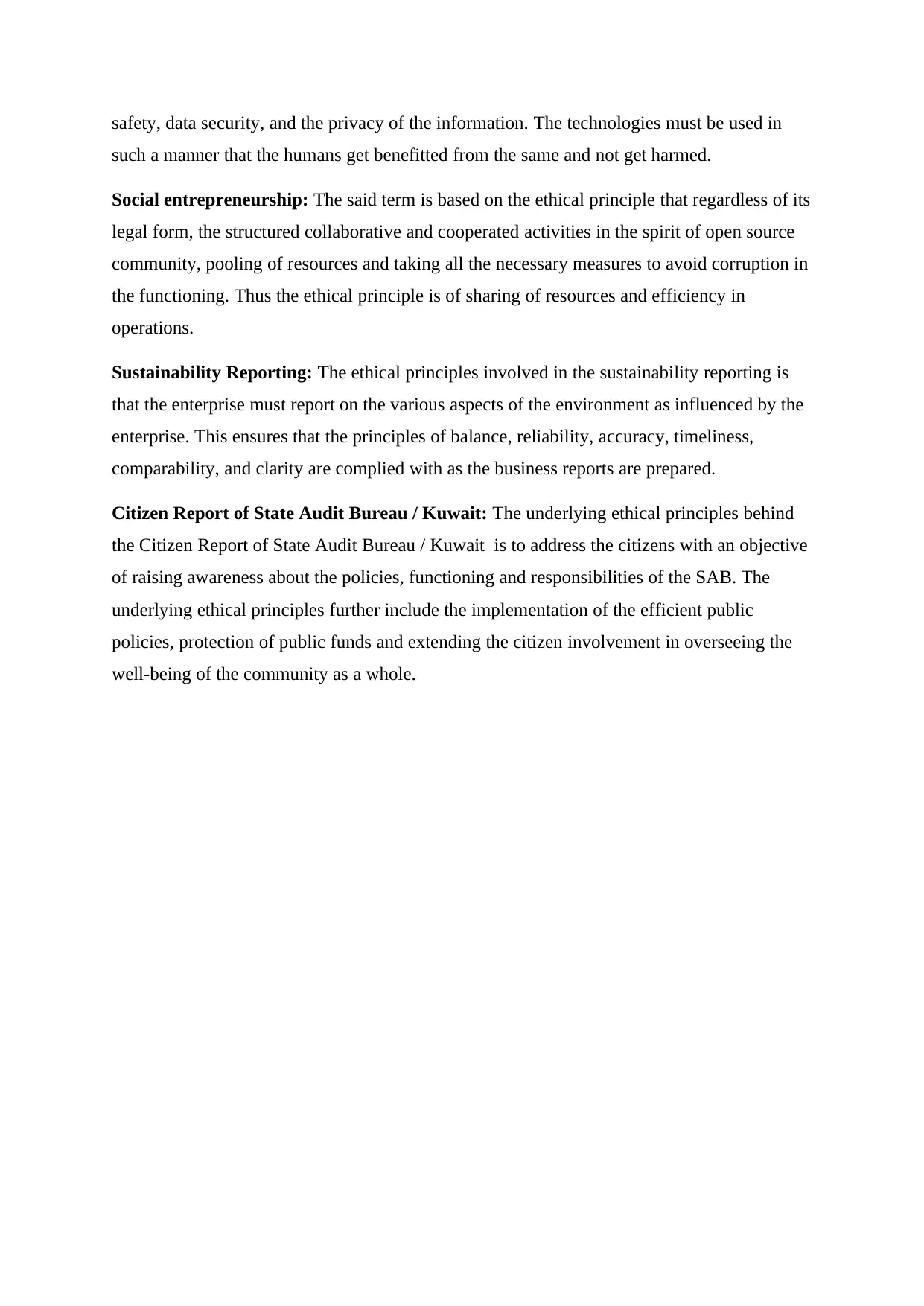
safety, data security, and the privacy of the information. The technologies must be used in
such a manner that the humans get benefitted from the same and not get harmed.
Social entrepreneurship: The said term is based on the ethical principle that regardless of its
legal form, the structured collaborative and cooperated activities in the spirit of open source
community, pooling of resources and taking all the necessary measures to avoid corruption in
the functioning. Thus the ethical principle is of sharing of resources and efficiency in
operations.
Sustainability Reporting: The ethical principles involved in the sustainability reporting is
that the enterprise must report on the various aspects of the environment as influenced by the
enterprise. This ensures that the principles of balance, reliability, accuracy, timeliness,
comparability, and clarity are complied with as the business reports are prepared.
Citizen Report of State Audit Bureau / Kuwait: The underlying ethical principles behind
the Citizen Report of State Audit Bureau / Kuwait is to address the citizens with an objective
of raising awareness about the policies, functioning and responsibilities of the SAB. The
underlying ethical principles further include the implementation of the efficient public
policies, protection of public funds and extending the citizen involvement in overseeing the
well-being of the community as a whole.
such a manner that the humans get benefitted from the same and not get harmed.
Social entrepreneurship: The said term is based on the ethical principle that regardless of its
legal form, the structured collaborative and cooperated activities in the spirit of open source
community, pooling of resources and taking all the necessary measures to avoid corruption in
the functioning. Thus the ethical principle is of sharing of resources and efficiency in
operations.
Sustainability Reporting: The ethical principles involved in the sustainability reporting is
that the enterprise must report on the various aspects of the environment as influenced by the
enterprise. This ensures that the principles of balance, reliability, accuracy, timeliness,
comparability, and clarity are complied with as the business reports are prepared.
Citizen Report of State Audit Bureau / Kuwait: The underlying ethical principles behind
the Citizen Report of State Audit Bureau / Kuwait is to address the citizens with an objective
of raising awareness about the policies, functioning and responsibilities of the SAB. The
underlying ethical principles further include the implementation of the efficient public
policies, protection of public funds and extending the citizen involvement in overseeing the
well-being of the community as a whole.
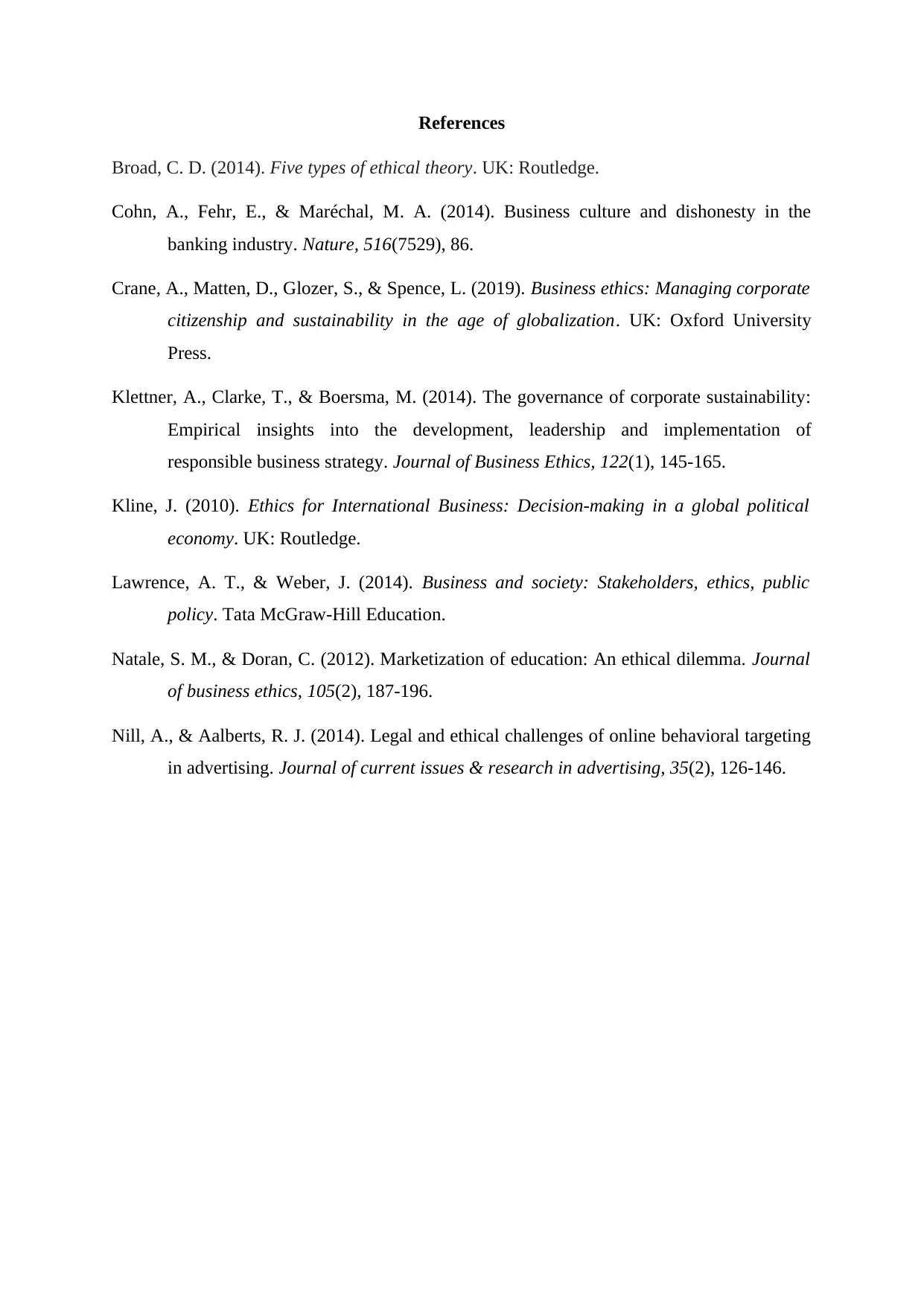
References
Broad, C. D. (2014). Five types of ethical theory. UK: Routledge.
Cohn, A., Fehr, E., & Maréchal, M. A. (2014). Business culture and dishonesty in the
banking industry. Nature, 516(7529), 86.
Crane, A., Matten, D., Glozer, S., & Spence, L. (2019). Business ethics: Managing corporate
citizenship and sustainability in the age of globalization. UK: Oxford University
Press.
Klettner, A., Clarke, T., & Boersma, M. (2014). The governance of corporate sustainability:
Empirical insights into the development, leadership and implementation of
responsible business strategy. Journal of Business Ethics, 122(1), 145-165.
Kline, J. (2010). Ethics for International Business: Decision-making in a global political
economy. UK: Routledge.
Lawrence, A. T., & Weber, J. (2014). Business and society: Stakeholders, ethics, public
policy. Tata McGraw-Hill Education.
Natale, S. M., & Doran, C. (2012). Marketization of education: An ethical dilemma. Journal
of business ethics, 105(2), 187-196.
Nill, A., & Aalberts, R. J. (2014). Legal and ethical challenges of online behavioral targeting
in advertising. Journal of current issues & research in advertising, 35(2), 126-146.
Broad, C. D. (2014). Five types of ethical theory. UK: Routledge.
Cohn, A., Fehr, E., & Maréchal, M. A. (2014). Business culture and dishonesty in the
banking industry. Nature, 516(7529), 86.
Crane, A., Matten, D., Glozer, S., & Spence, L. (2019). Business ethics: Managing corporate
citizenship and sustainability in the age of globalization. UK: Oxford University
Press.
Klettner, A., Clarke, T., & Boersma, M. (2014). The governance of corporate sustainability:
Empirical insights into the development, leadership and implementation of
responsible business strategy. Journal of Business Ethics, 122(1), 145-165.
Kline, J. (2010). Ethics for International Business: Decision-making in a global political
economy. UK: Routledge.
Lawrence, A. T., & Weber, J. (2014). Business and society: Stakeholders, ethics, public
policy. Tata McGraw-Hill Education.
Natale, S. M., & Doran, C. (2012). Marketization of education: An ethical dilemma. Journal
of business ethics, 105(2), 187-196.
Nill, A., & Aalberts, R. J. (2014). Legal and ethical challenges of online behavioral targeting
in advertising. Journal of current issues & research in advertising, 35(2), 126-146.
⊘ This is a preview!⊘
Do you want full access?
Subscribe today to unlock all pages.

Trusted by 1+ million students worldwide
1 out of 6
Related Documents
Your All-in-One AI-Powered Toolkit for Academic Success.
+13062052269
info@desklib.com
Available 24*7 on WhatsApp / Email
![[object Object]](/_next/static/media/star-bottom.7253800d.svg)
Unlock your academic potential
Copyright © 2020–2026 A2Z Services. All Rights Reserved. Developed and managed by ZUCOL.





